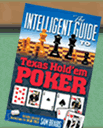| Win at High-Low Poker! Vital knowledge to profit from Seven-Card Stud High-Low. Get a competitive edge. |
| StudHighLow.com |
Excerpt from: The Intelligent Guide to Texas Hold'em Poker
This book provides a concise summary of Texas Hold’em poker, including rules, conduct, tactics, and strategies. Read this book to:
- Learn the rules of Texas Hold’em.
- Learn poker terminology.
- Learn to play Texas Hold’em in a public cardroom.
- Learn to play Texas Hold’em online.
- Learn the fundamental tactics and strategies.
- Learn to become a winning poker player.
The goal of this book is to provide the tools you need to play an intelligent game of Texas Hold’em in any venue, and to give you a greater understanding of poker, in general.
Texas Hold’em is one of the many variations of poker. In all poker games, money is wagered on the outcome of each hand, but each variation of poker has its own structure for dealing cards, betting, and awarding the money wagered. Winning money is the object of all poker games. Without monetary stakes, poker is a meaningless game. Poker combines elements of both skill and luck. The structure of the game determines the extent to which skill is more of a factor than luck.
The variations of poker that have become standards in cardrooms online and throughout the United States fall into two broad categories: flop games (Texas Hold’em, Omaha, and Omaha High-Low Eight-or-Better) and board games (Seven-Card Stud, Razz, and Seven-Card Stud High-Low Eight-or-Better). Of these variations, Texas Hold’em is the most popular. All these poker variations require a high degree of skill to be successful. Only players with the knowledge, discipline, and patience to execute correct strategies will win over the long-run.
Compared to the board games, flop games, such as Hold’em, are characterized by:
- More players: Unlike Seven-Card Stud, in which a deck supports only seven players, in Texas Hold’em, the deck can support 23 players. In practice, cardrooms seat up to 10 players at a Hold’em table.
- Faster play: More hands per hour are played in Hold’em because fewer cards are dealt from the deck. No more than 25 cards are dealt in a 10-player game. With a fast dealer, it is possible to play as many as 40 hands per hour.
- Less memorization: All exposed cards in Hold’em remain on the table. There is no need to remember the contents of previously folded hands.
- More competitive hands: The characteristic feature of Hold’em is the use of shared cards to make up a hand. Since most of your cards are also everybody else’s, there will not be a great disparity between the strengths of the winning and losing hands.
Hold’em is a complex, exciting, and aggressive game. For both the recreational and serious gambler, mastering Hold’em is a source of much enjoyment and many rewards.
Excerpt from:The Intelligent Guide to Texas Hold'em Poker
| Paperback, 274 pages, Size 9"x 6", Weight 12 oz (340g). | ||||
|---|---|---|---|---|
| Author | Price | Year | ISBN | LCCN |
| Sam Braids | US $16.95 | © 2010 | 978-0-9677551-4-4 | 2009943249 |
| About the Book | Table of Contents | Tables and Figures | Excerpts | Order the Book |
Types of Poker Games: Poker variants fall into two broad categories-flop games and board games. Here is brief summary of the popular games. ... Read More
Poker Tournament Considerations: As a result of widespread television coverage, poker tournaments have grown tremendously in popularity. For poker players, tournaments offer high entertainment value for a fixed dollar amount that is paid up-front. ... Read More
Learning to Create Luck: Poker enthusiasts have long debated the role of luck in poker. Clearly poker involves both luck and skill. If the game did not require skill you would not see consistent life-long winners. ... Read More
Counterfeit Cards: A counterfeit bill is one that appears real but is actually a worthless fake. In poker a counterfeit card is one you hold that appears to have great value, but in reality the rules of the game do not allow the card to even play. ... Read More
Cash Game Freerolls: I have a deal for you! It’s a no-lose investment opportunity. The worse that can happen is you get your money back. But, there is a significant chance of doubling your investment or more if things work out. Want to buy in? ... Read More
Online Poker on a Macintosh: While Mac owners have limited choice when it comes to poker, they do have the ability to play poker online and options for expanding their choices. ... Read More

